Nasser Laham, the editor-in-chief of Palestine’s biggest independent media outlet, used to be an ardent supporter Abbas and the peace process. But after decades of failed attempts, something inside him changed. Today he believes Palestinians must stop talking about peace. ‘We’ll wait a thousand years, the Israelis will be defeated. What’s the hurry?’
By Meron Rapoport
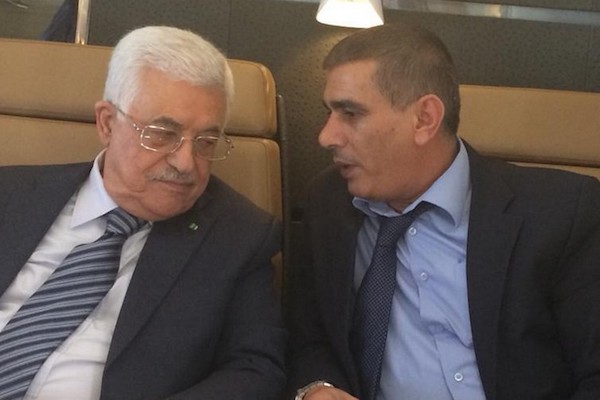
You won’t find a Palestinian journalist who understands Israel and the Israelis like Nasser Laham. He took advantage of the Hebrew he learned while serving time in prison to become the most prominent commentator on Israeli affairs in the Palestinian media, hosting a popular daily television show that analyzes and translates the Israeli media for the Palestinian public. For years he served as a daily source for many Israeli journalists, hosting them in his Bethlehem office, even in his home, and speaking to them on the phone. Many are daily readers of Ma’an News Agency, the popular Palestinian news site where he serves as editor in chief.
I have known Laham for over 15 years. Despite the bloody days of the Second Intifada, the international community still believed that if only Palestinian and Israeli journalists met, they would reach an understanding that would help usher in peace. In many cases, the meetings that did take place — in countries such as Cyprus, Turkey, and Jordan — only served to deepen the divide between the two sides. But Laham and I connected, and we have remained in touch all these years.
The phrase “man of peace” is a bit contrived, but throughout the years Laham continued to support negotiations between Israel and the Palestinians, believing that a peace agreement was possible. He was close to Palestinian President Mahmoud Abbas, justifying the latter’s decision to establish a Palestinian state within the 1967 borders — through a negotiated settlement, rather than armed struggle — the moment Abbas replaced Yasser Arafat as the head of the PLO and the PA. Laham says Abbas even used to refer to him as “my son.”
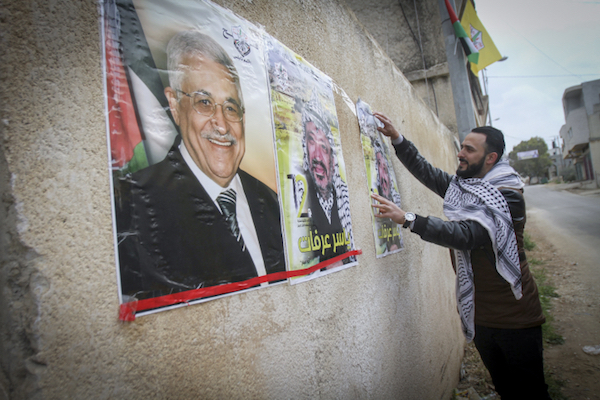
Over the past few years, Laham has taken a different approach. Like many Palestinians, he has lost faith in Abbas’ path. The last straw was Trump’s decision to move the U.S. Embassy to Jerusalem. A short while after the declaration, Nasser wrote an article titled “The Jews’ Journey has Ended.” In another piece, Nasser wrote that at this point, we can only discuss Jews leaving the country.
When his father passed away two weeks ago, I went to visit the family in a small hall in Dheisheh refugee camp, where Laham was born and raised. After shaking the hands of the men, Laham came and sat next to me. “My father was 90, he was older than the State of Israel by 20 years,” he told me. “He was 20 years old during the Nakba, and all his life he waited to return to his village in Beit Itab (not far from present-day Beit Shemesh, M.R.). He waited in 1949, he waited in 1956, he waited in 1967, he waited during Oslo. They told him he would return. When I moved from Dheisheh to Bethlehem in 2006, he told me: ‘why are you hurrying? We’ll wait.’”
My father was right, Arafat was wrong
In addition to paying my respects, I had traveled to Bethlehem to try to understand Laham’s transformation, especially since clearly he is not the only Palestinian to undergo it. I can’t say I left feeling encouraged. Although it often seems as if he is trying to be provocative, it is clear that his beliefs reflect something deeper: the growing sense among Palestinians that there is no chance for peace with Israel; that Israel is uninterested in peace. That Israel wants to continue to occupy and kill, and therefore the only solution is for Zionism to disappear and for Zionists to leave Palestine. Not by force, he says. But the solution is clear.
When we met 15 years ago, you had hope that the conflict could be solved. Why did you think that then?
“Because Yasser Arafat convinced us, the Palestinian people, that there was a solution, and that Israel had its own DeGaulle. Now we have discovered that we were wrong. We do not need to apologize to anyone. Israel needs to apologize. The occupation needs to apologize. The occupation needs to apologize to every Jew and Arab that has been killed. The occupation needs to apologize to the Jews and the Arabs. There was plenty of blood 15 years ago, but far less hatred.”
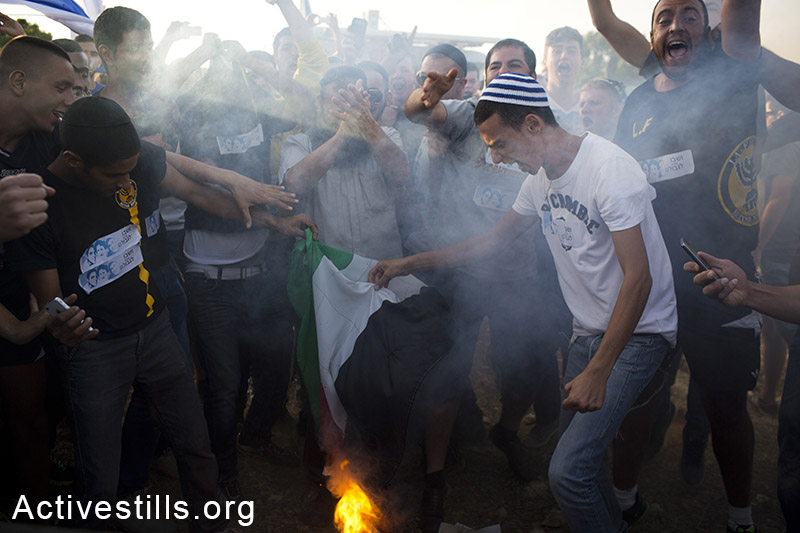
“Today there is hatred in every home. Hatred has turned into a wild beast that roams the streets. This hatred needs 100 years until it disappears. Never in my entire life have I seen such hatred. The laws in the Knesset, the racism, the fascism, the Nazism, the barbarism. The Zionist movement is the worst in history when it comes to sowing hatred between nations. There is no hope for peace with it. No possibility for peace.”
But there was no return of refugees during Oslo. What did you tell your father back then?
“My father wanted to return to his village near Ramla. When he heard that Arafat had agreed to reconciliation with Israel, he said: Arafat is wretched, and I thought that my father was wretched and that Arafat was a great leader. In the meantime both passed away, and now it has become clear that my father was a great leader and Arafat was wretched because the Israelis killed him. My father’s fears were justified. You cannot make peace with Zionists unless you force them. We cannot fight them, we do not want to kill them. We have no armies, no weapons, no means, and no possibilities. That is why we need to respond to hatred with silence, with apathy. We will liberate Palestine quietly.”
What does that mean?
“All the politicians, from the days of Gamal Abdel Nasser, have said that we must find a solution to the conflict. Then came Kissinger and the rest of the leaders of the world and asked the Arabs: “What is your solution?” Until this very day the Israelis think that the Palestinians must come up with a solution. I am telling you that there is no solution. I am from Ramla and I want to return to Ramla. There is no other solution. There is no solution in Ramallah, there is no solution in any other city, and no Arab country can provide another solution. If the Jews and Israelis have a problem, they must solve it themselves. Trump and Nicki Haley are responsible for the devastation of the next 100 years. Let them solve your problems.”

“So how do we find a solution? We wait a thousand years. The Israelis will be defeated and flee. What’s the hurry? Why are the Arabs hurrying? You remember what Hafez al-Assad told Ehud Barak and Bill Clinton at Geneva? They said: if you don’t do this and that, there won’t be a solution. He responded: we’ll wait another 100 years. And I’m also telling you, we’ll wait another 100 years. What’s the problem? There is no solution apart from taking all of Palestine and living in all of Palestine. From Metulla and Naqura until Eilat. The solution is waiting. No initiating any talks. The Palestinian leadership is wrong. Abbas is wrong to look for a solution. In France, in Italy, in Germany, in America. Why is he searching for a solution? Let the Israelis search for a solution.”
The Israelis must search for a solution?
“This is the Zionists’ problem, let them find a solution.”
The Palestinians do not have problems?
“No. I don’t have a problem. I am a fighter, I have patience, I hold steadfast to my occupied country. It is my honor to be here, it is my honor to be a prisoner, it is my honor to be a shaheed, respect to the people of Gaza for living under siege. Israelis should be ashamed of being Israeli. Abbas is old and I wish him health, but after he goes, I don’t think you’ll find a single Palestinian who will talk to you about solutions. Not Saeb Erekat, not Majd Farj, and not Jibril Rajoub. No one will dare say “I have a solution.” The solution is for the occupation to end.”

You’re not giving your people any hope.
“The people will wait.”
You say the Jewish journey has ended. Does that mean there is no room here for any Jews?
“This place isn’t convenient for you. You can go live in America. The Americans love the Jews. If the Zionist movement decides to move to America, the Palestinian leadership will travel to the airport in Lod and wave them goodbye. The Jews can return as tourists without visas. Why should they stay, fight, and die?”
There are six million Jews here. That’s the reality.
“Nations have moved throughout history. The Tatars, the Kurds. It happened. Zionism expelled six million Palestinians (referring to the current number of Palestinian refugees – M.R.). It happens. I think that the best place for Jews is America. What are you looking for in the backwards and Islamic Middle East?”
Is living together impossible?
“There is no possibility of that.”
And if Israel ends the occupation?
“Too late, too late.”
In South Africa they found a solution.
“You don’t have a de Klerk and we don’t have a Nelson Mandela.”
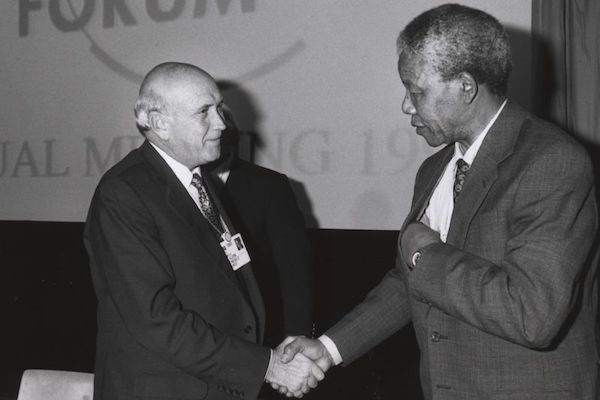
And if we do find our own de Klerk and Mandela?
“There is a one in a hundred chance. If Marwan Barghouti is freed and I sit with him in Ramallah and he tells me that there is a possibility, I’ll listen and believe it. If this doesn’t happen, I won’t believe anyone. Neither to the leadership in Ramallah nor the leadership in Gaza. I don’t want to hear them.”
Abbas is more extreme than me
Despite his criticisms of Abbas, is it possible that Laham is actually expressing what the Palestinian president wants to say but cannot? “Abbas is more extreme than me,” he says. That’s how Laham interprets Abbas’ comments directed at Trump (“May your house be destroyed”), his remarks about U.S. Ambassador to Israel David Friedman (“son of a dog”) or his most recent speech to the PLO Executive Committee, in which he called Zionism a European colonial project, and said the persecution of Jews in Europe was a result of their charging interest. “When Abbas says we were here before Abraham, this is exactly what he means,” says Laham.
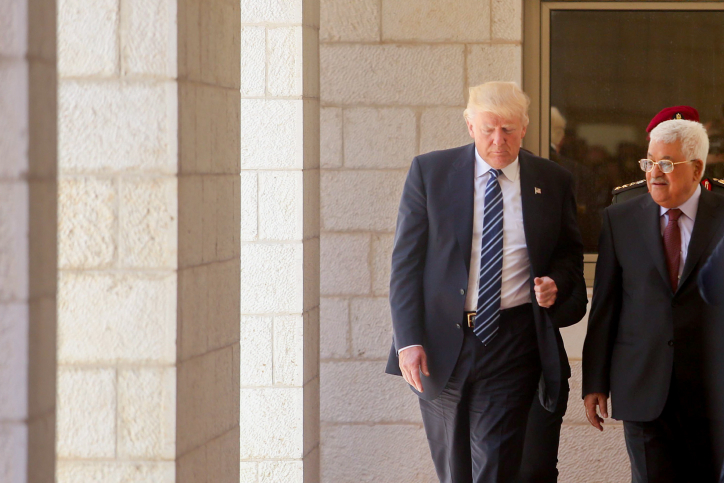
You have many Israeli friends. What do you say to them?
“I lost three-fourths of them. Anyone who supports the occupation is not my friend. My friend is the person who opposes the occupation. Who fights for justice and for children, for humanity. Most of those who were my friends support the occupation. I see what they write, what they say. Anyone who justifies shooting dozens of bullets at a 12-year-old boy is no friend of mine, and I don’t want him as my friend, even if he is Arab or Muslim.”
The Palestinian people are very political. You are effectively suggesting to give up on political thinking.
“The Palestinians are a smart, educated people who have paid a high price in lives lost, in prisons. It is not a violent nation. Angry, but not violent. I am angry, but I am not violent. The occupation is violent and not angry. The Zionist is violent and not angry. When Salam Fayyad established the government in 2007, he asked Israel for a list of wanted Palestinians. They gave him a list of 480 people — 280 in the West Bank, 200 in Gaza. That means that 500 people were behind the Second Intifada. These are statistics provided by the Shin Bet. This is a tiny percentage of the Palestinian people. Less than a hundredth.”
“That is why I say that the Palestinian people are angry — not violent. They are smart. They understand that there is no military solution, no political solution, no economic solution, and no historic solution. What kind of understanding can I bring to Itamar Ben-Gvir (a far-right activist and lawyer associated with the anti-Arab Kahanist movement – M.R.), or Uri Ariel? What kind of common thinking do we have about the meaning of life, the meaning of history, the meaning of religion and politics?”
Not all Israelis are Itamar Ben-Gvir.
“I don’t see them.”
What responsibility do Palestinians have?
“We have no responsibility. Is your family in Europe responsible for the rise of the Nazis?”
The question is what responsibility the Palestinians have for managing their own affairs and politics.
“I will make an effort in the media so that no Palestinian makes a proposal. Had we a direct Palestinian leadership, it would have apologized to the Palestinian people for Oslo and its fake peace and illusions, which caused us to lose 30 years of our lives. But I do not think that there is a Palestinian leader — in Fatah, Hamas, the left or in any party — that has the courage to apologize to the Palestinian people.”
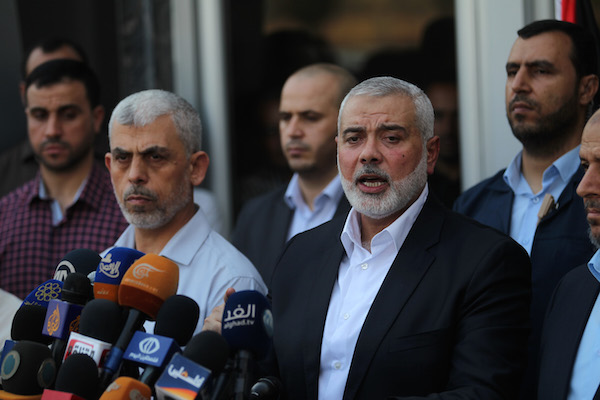
“The Palestinian leadership needs to apologize for peace with Israel, it must feel remorse, because the new generations are now growing up. Every year, 43,800 Palestinian students graduate from Palestinian universities. The government employs 1,200 of them. The rest are unemployed and sit on the streets. Seventy percent of Palestinians are under 45, but there is not a single person in the Palestinian leadership under the age of 45. This is a young, educated, and oppressed society.”
Before I leave Laham’s office, I meet a member of that generation at the reception table. The young woman, her hair covered by a hijab, says she has never met a Jew in her life. She was born in Kuwait, came to the West Bank after the First Gulf War in 1991, and has never spoken spoke to a Jewish person who was not a soldier. Both of us are clearly a bit embarrassed by the situation. “You see what the wall does,” Laham says. “We don’t know each other. That’s the greatest disaster. You drive straight to Tel Aviv, I stay here.”
Meron Rapoport is an editor at Local Call, where a version of this article first appeared in Hebrew. Read it here.
